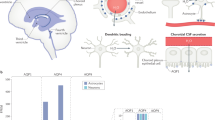The Movements of Water and Solutes in the Brains of Mammals (original) (raw)
Summary
In normal animals there seems to be little or no bulk flow across CNS capillaries and through neural tissue. The resistance to volume flow at each of these sites seems to be too great for significant convective transport to take place; yet, during the time course of cerebral edema, relatively large flows of fluid do occur both at the capillaries and through the ECS. Such changes in bulk fluid movement probably involve alterations in the hydraulic conductivity of cerebral blood vessels, the solute reflection coefficients and concentration differences across the blood-brain barrier and the hydraulic conductivity of the tissue ECS (the latter as a result of increases in the size and channel width of the space).
Preview
Unable to display preview. Download preview PDF.
Similar content being viewed by others
CSF Physiology
Chapter © 2023

References
- Blasberg, R., Patlak, C., Fenstermacher, J.: Intrathecal chemotherapy: brain tissue profiles after ventriculocisternal perfusion. J. Pharmacol. exp. Ther. 195, 73–83 (1975)
PubMed CAS Google Scholar - Fenstermacher, J.P., Johnson, J.A.: Filtration and reflection coefficients of the rabbit blood-brain barrier. Amer. J. Physiol. 211, 341–346 (1966)
PubMed CAS Google Scholar - Fenstermacher, J., Rall, D., Patlak, C., Levin, V.: Ventriculocisternal perfusion as a technique for analysis of brain capillary permeability and extra-cellular transport. In: Alfred Benzon Symposium II, Capillary Permeability. Crone, C., Lassen, N. (eds.). Copenhagen, Munksgaard, 1970, pp. 483–490
Google Scholar - Katzman, R., Pappius, H.M.: Brain Electrolytes and Fluid Metabolism. Baltimore: Williams and Wilkins 1973, p. 373
Google Scholar - Katzman, R., Schimmel, H.: Water movement. In: Handbook of Neurochemistry. Lajtha, A. ( ed.). New York-London: Plenum Press 1969, Vol. II, pp. 11–22
Google Scholar - Kessler, J.A., Fenstermacher, J.D., Owens, E.S.: Spinal subarachnoid perfusion of rhesus monkeys. Amer. J. Physiol. 230, 614–618 (1976)
PubMed CAS Google Scholar - Pappenheimer, J., Soto-Rivera, A.: Effective osmotic pressure of the plasma proteins and other quantities associated with the capillary circulation in the hindlimbs of cats and dogs. Amer. J. Physiol. 152, 471–491 (1948)
PubMed CAS Google Scholar - Patlak, C.S., Fenstermacher, J.D.: Measurements of dog blood-brain transfer constants by ventriculocisternal perfusion. Amer. J. Physiol. 229, 877–884 (1975)
PubMed CAS Google Scholar - Rapoport, S.: Blood-Brain Barrier in Physiology and Medicine. New York: Raven Press 1976, pp. 119–120
Google Scholar - Rapoport, S., Mori, M., Klatzo, I.: Testing of a hypothesis for osmotic opening of the blood-brain barrier. Amer. J. Physiol. 223, 323–331 (1972)
PubMed CAS Google Scholar - Vargas, F., Johnson, J.: An estimate of reflection coefficients for rabbit heart capillaries. J. gen. Physiol. 47, 667–677 (1964)
Article PubMed CAS Google Scholar - Welch, K.: Discussion. In: The Proceedings of a Symposium on the Blood-Brain Barrier. Coxon, R.V. (ed.). Oxford: Univ. Press Truex 1970, pp. 170–171
Google Scholar - Welch, K., Sadler, K., Gold, G.: Volume flow across choroidal ependyma of the rabbit. Amer. J. Physiol. 210, 232–236 (1966)
Google Scholar
Author information
Authors and Affiliations
- Membrane Transport Section, Division of Cancer Treatment, National Cancer Institute and Theoretical Statistics and Mathematics Branch, Bethesda, Md., USA
J. D. Fenstermacher & C. S. Patlak - Division of Biometry and Epidemiology, National Institute of Mental Health, National Institutes of Health, Bethesda, Md., USA
J. D. Fenstermacher & C. S. Patlak
Authors
- J. D. Fenstermacher
You can also search for this author inPubMed Google Scholar - C. S. Patlak
You can also search for this author inPubMed Google Scholar
Editor information
Editors and Affiliations
- Dept. of Neurology and Neurosurgery, McGill University, 3801 University Street, H3A 2B4, Montreal, Que., Canada
Hanna M. Pappius Ph. D. (Associate Professor, Associate Neurochemist) & William Feindel M. D., D. Phil., F.R.S.C. (Professor, Director) (Associate Professor, Associate Neurochemist) & (Professor, Director) - Montreal Neurological Institute, 3801 University Street, H3A 2B4, Montreal, Que., Canada
Hanna M. Pappius Ph. D. (Associate Professor, Associate Neurochemist) & William Feindel M. D., D. Phil., F.R.S.C. (Professor, Director) (Associate Professor, Associate Neurochemist) & (Professor, Director)
Rights and permissions
Copyright information
© 1976 Springer-Verlag Berlin · Heidelberg
About this paper
Cite this paper
Fenstermacher, J.D., Patlak, C.S. (1976). The Movements of Water and Solutes in the Brains of Mammals. In: Pappius, H.M., Feindel, W. (eds) Dynamics of Brain Edema. Springer, Berlin, Heidelberg. https://doi.org/10.1007/978-3-642-66524-0\_16
Download citation
- .RIS
- .ENW
- .BIB
- DOI: https://doi.org/10.1007/978-3-642-66524-0\_16
- Publisher Name: Springer, Berlin, Heidelberg
- Print ISBN: 978-3-540-08009-1
- Online ISBN: 978-3-642-66524-0
- eBook Packages: Springer Book Archive

